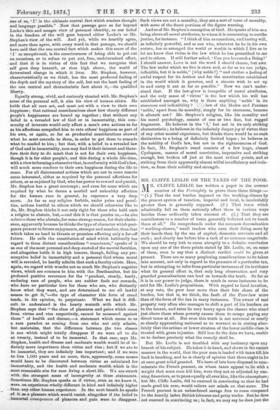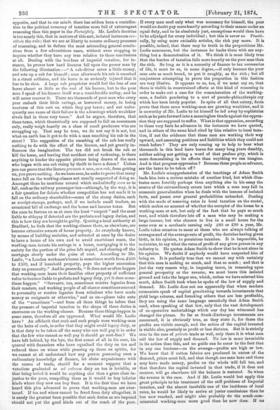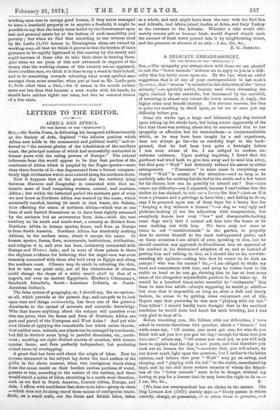MR. CLIFFE LESLIE ON THE TAXES OF THE POOR.
II R. CLIFFE LESLIE has written a paper in the current li.1. number of the Fortnightly to prove these three things :— " (1.) That the real burden imposed on the working-classes by the present system of taxation, imperial and local, is incalculably greater than is generally supposed. (2.) That taxes which admittedly fall on them seriously affect them in various ways besides those ordinarily taken account of. (3.) That they are contributors to a number of taxes generally believed not to touch thaw at all." He comprehends under the common denomination " working-classes," small traders who earn their living more by their hands than by the use of capital, domestic servants and all such ; and clearly has before him a task of no common magnitude. We should be very loth to come abruptly to a definite conclusion upon any one of the three points stated by Mr. Leslie, or, on some of them, even to say that a distinct verdict could be given at present. There are so many perplexing considerations to he taken into account, not only in regard to the pressure of a particular tax, but in attempting to infer from particular instances of its incidence what its general effect is, that only long observation and very guarded generalisations can lead us towards the truth. So far as it is in our power to judge, there is much in some instances to be said for Mr. Leslie's propositions. With regard to local taxation, at any rate, the poor bear more than their fair share of the burden, but that is, we think, the fault of the Poor-law more than of the form of the tax in many instances. The owner of real property very often also manages to shift a part of his burdens on to the tenant, and rates•lie very heavy upon the classes who stand just above those whose poverty causes them to escape paying any direct taxes at all. But even this truth is not universal or nearly so closely approaching universal as to warrant us in stating abso- lutely that the artisan or lower stratum of the lower middle-class-is treated with gross injustice. Still leas do the data we have, enable us to declare precisely what the remedy shall be.
But Mr. Leslie is not troubled with any hesitancy upon any branch of his subject. He takes it in hand, and shows in the easiest manner in the world, that the poor man is loaded with taxes till his back is breaking, and he is clearly of opinion that there ought to be at once great relief granted. We have of late been disposed to com- miserate the French peasant, on whom taxes appear to lie with a weight that must soon kill him, were they not so adjusted by cun- ning financiers, as to press equally all over him, like the atmosphere ; but Mr. Cliffe Leslie, did he succeed in convincing us that he had made good his case, would relieve our minds on that score. The French peasant is an unburdened savage free to roam compared to the heavily laden British labourer and petty trader. But he does not succeed in convincing us ; in fact, we may say he does just. the opposite, and that to our minds there has seldom been a contribu- tion to the political economy of taxation more full of extravagant reasoning than this paper in the Fortnightly. Mr. Leslie's doctrine is too nearly this, that in matters of this sort, isolated instances con- stitute the rule; that we are at liberty to reverse ordinary processes of reasoning, and to deduce the most astounding general conclu- sions from a few adventitious cases, without even stopping to inquire whether they have any true relation to those conclusions at all. Dealing with the burdens of imperial taxation, for in- stance, he proves how hard licences fall upon the poorer man by the following illustration :—" A cab-driver saves a little money, and sets up a cab for himself ; soon afterwards his cab is smashed in a street collision, and his horse is so seriously injured that it has to be shot. A large cab proprietor would feel the loss of one horse almost as little as the cost of his licence, but to the poor man I speak of his licence itself was a considerable outlay, and he will never recover it. There are thousands of poor men who every year embark their little savings, or borrowed money, in losing ventures of this sort on which they pay taxes ; and not unfre- quently one cause of their failure is the advantage which wealthier rivals find in these very taxes." And he argues, therefore, that these taxes, which theoretically are supposed to fall on consumers only, really weigh heavily on a class of small producers who are struggling up. That may be true, we do not say it is not, but what on earth has it got to do with a man smashing his cab in the street ? The suggestion of the smashing of the cab has really nothing to do with the effect of the licence, and yet greatly in- fluences the imagination. The tax did not break the cab or kill the horse, and leaving that accident out of reckoning, is there anything to hinder the opposite picture being drawn of the man who began with one cab rising by thrift to have a dozen ? Unless you can prove that the licence prevents a man, as a rule, from getting on, you prove nothing. As we have seen, he seeks to prove that many taxes fall on the working-classes not usually suspected of doing so. Amongst those he mentions several which undoubtedly seem so to fall, such as the railway passenger-tax—although, by the way, it is a fair question for debate whether competition has not made it to fall on the ordinary shareholder—some of the stamp duties, such as receipt-stamps, perhaps, and, if we include small traders, an occasional bill of exchange and the house and income taxes. But the ones he fastens on as at once the least "suspect " and the most liable to obloquy if detected are the probate and legacy duties, and this is how they are brought in guilty. Quoting a local authority at Bradford, he finds that the working-classes there, as elsewhere, are become extensive owners of house property. As everybody knows, by means of building societies, and actuated at once by the desire to have a house of his own and to avoid exorbitant rents, the working-man invests his savings in a house, mortgaging it to the society for the portion of the price left unpaid, and clearing off the mortgage slowly under the guise of rent. According to Mr. Leslie, "a London workman's house is sometimes worth from £400 to £500, and if leasehold property, pays the higher succession duty on personalty." And he proceeds, " It does not so often happen that working-men leave their families other property of sufficient value to become liable to probate and legacy duty, yet it does some- times happen." "Servants, too, sometimes receive legacies from their masters, and working people of all classes sometimes succeed to personalty or receive legacies from relations who have made money as emigrants or otherwise," and so on—please take note of the " sometimes "—and from all these things he infers that the pressure of imperial taxation in the shape of these duties is enormous on the working-classes. Because these things happen in some cases, therefore all are oppressed. What would Mr. Leslie have ? An affidavit that such and such people were working-men or the heirs of such, in order that they might avoid legacy duty, or is that duty to be taken off the many who can well pay it in order that the few who cannot so well pay it should go scot-free ? We have left behind, by the bye, the first count of all in his case, his quarrel with financiers who have equalised the duty on tea and reduced those on wines while pressing up those on spirits, for we cannot at all understand how any person possessing even a rudimentary knowledge of finance, let alone acquaintance with the course of trade, should for a moment suppose that a vexatious graduated or ad valorem duty on tea is leviable, or that being levied it would be anything else than a gross class in- justice to the poor, compelling them as it would to buy inferior kinds where they now can buy finer. It is the first time we have heard this plea advanced to prove that working-men are over- taxed. If tea and wines cannot be freed from duty altogether, it is surely the greatest boon possible that such duties as are imposed should not put the good kinds out of the reach of the poor.
If every man used only what was necessary for himself, the poor would no doubt pay more heavily according to their means under an equal duty, and to be absolutely just, exemptions would then have to be adjudged for every individual ; but this is never so. Practi- cally, by using more excisable articles, the rich pay more. It is possible, indeed, that there may be truth in the propositions Mr.
Leslie announces, but the instances he backs them with are any- thing but a demonstration of it. We think it is most likely true that the burden of taxation falls more heavily on the poor man than the rich. So long as it is a necessity of finance to tax necessaries of life, it must be so, in some degree,—if only because the poor man eats as much bread, to put it roughly, as the rich ; but all conjectures attempting to prove the proportion in this fashion are very illusive. It appears to us, too, if we must say so, that there is visible in overstrained efforts at this kind of reasoning in order to make out a case for the commiseration of the working- man, a foolish pandering to a sort of pseudo-philanthropic cry which has been lately popular. In spite of all that outcry, facts prove that these same working-men are growing wealthier, and it is unworthy of Mr. Leslie to let himself be led away by sophistries such as he puts forward into a meaningless tirade against the oppres- sion they are supposed to suffer. What is that oppression, according to those very facts be advances in the instances we have quoted, and in others of the same kind cited by him relative to local taxa- tion, if not the evidence that these men are working their way upward, and assuming positions and liabilities which they could not reach before ? They are only coming up to help to bear what thousands in this land have borne for many long years dumbly, neither asking nor getting a word of that profuse pity, which is more demoralising in its effects than anything we can imagine. And is that progress oppression ? Because these people so advance, are the taxes to be taken off ?
Mr. Leslie's misapprehension of the teachings of Adam Smith leads him into a serious mistake of another kind, but which illus- trates more forcibly perhaps than anything else in his essay the source of the extraordinary errors into which a man may fall in economic generalisation when he deals with the lessons of isolated facts, and passes over general probabilities unheeded. Dealing with the mode of assessing rates in local taxation on the rental, which makes no account of whether the occupier of the house be a working-man or not, but only of the fact that he pays so much rent, and which therefore lets off a man who may be making a large income, but who chooses to live in a small house for the same sum as a mechanic earning only £80 or £90 a year, Mr. Leslie takes occasion to sneer at those who are always talking of averages and of the average rate of profit, the doctrine having given birth, in his opinion, to pernicious taxation. It is impossible, he maintain; to say what the rates of profit of any given person in any industry is. He quotes Adam Smith to show that he is not alone in his opinion. We doubt if anybody would have suspected him of being so. It is perfectly true that we cannot say with certainty that this man is making so much, and that so much ; and that is just the very reason why, in imposing taxes, in reasoning upon general prosperity or the reverse, we must leave this isolated ground and take the larger one, which, unless we have misread him much, Adam Smith took when he spoke of the law of supply and demand. Mr. Leslie does not see apparently that when modern economists speak of capital gravitating towards investments that yield large returns, and forsaking others that are less profitable, they are using the same language essentially that Adam Smith used, when speaking of that law, only that the vast development of co-operative undertakings which our day has witnessed has changed the phrase. So far as Stock-Exchange investments are concerned, it is obviously true, as they state it, for there the profits are visible enough, and the action of the capital invested is visible also, precisely as profit or loss dictates. But it is strictly true in the case of private trade as well, only there it is what men call the law of supply and demand. No law is more invariable in its action than this, and no guide can be surer to the fact that in any one business—on the average—profits are high or low. We know that if cotton fabrics are produced in excess of the demand, prices must fall, and that though one man here and there may have made money, profits on the whole will fall too, and that therefore the capital invested in that trade, if it does not recover, will go elsewhere till the balance is restored. So when the reverse is the case. And if Mr. Leslie would but apply this great principle to his treatment of the stiff problems of Imperial taxation, and the almost insoluble one of the incidence of local rates, he would be likely to arrive at juster conclusions than he has now reached, and might also probably do the much-com- miserated working-man more good than he now does. If no
'working-men rose to occupy good houses, if they never managed to leave a leasehold property or to acquire a freehold, it might be possible to say that the heavy taxes levied by the Government upon 'real and personal estate lay at the bottom of such immobility and poverty ; but when we find that according to one witness cited 'by Mr. Leslie 13,000 houses in Birmingham alone are owned by "working-men, all that we think it proves is that the burden of taxes promises to be rapidly lightened in this country by the steady and rapid increase of those able to take their share in bearing them. And when we see pleas of this sort advanced in support of the -theory that the working-classes of this country are an oppressed, -down-trodden race, we think it is time to say a word in their behalf, and to do something towards rebutting what every spirited man amongst them must consider, when put at least as Mr. Leslie puts it, little other than a libel,—for it means in his mouth neither snore nor less than that because a man works with his hands, he :should have neither rights nor rates, but live an untaxed citizen .of a free state.




































 Previous page
Previous page